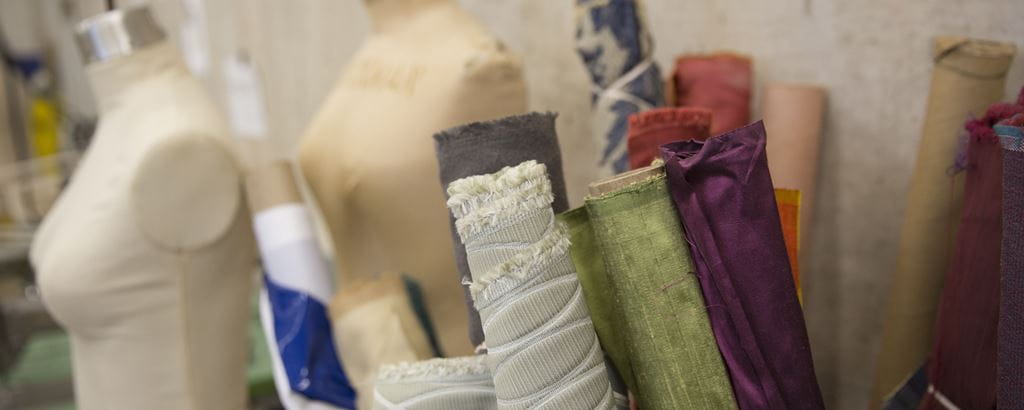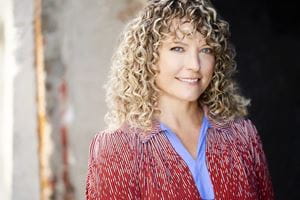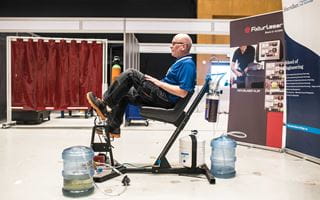
Journalism alumna leads the way toward a more sustainable fashion future
 by Olivia McLeod – Apr 20, 2023
by Olivia McLeod – Apr 20, 2023  For Kelly Drennan (Print Journalism, ’98), the reason to devote her life to fashion sustainability is simple: “In two short words: my daughters,” she says.
For Kelly Drennan (Print Journalism, ’98), the reason to devote her life to fashion sustainability is simple: “In two short words: my daughters,” she says.
Always interested in the industry, she began her career in the world of fashion journalism, working for magazines and eventually starting her own public relations company. However, in 2007 she decided to turn her career towards uncovering fashion’s social and environmental impacts.
“Around the time my second daughter was born, I saw Al Gore's documentary An Inconvenient Truth. That was my first real ‘a-ha’ moment,” she reflects. “I saw the destruction of the planet and climate change, how real that was and thinking about (my children’s) future, I felt really compelled to do something.”
She turned this passion into action by founding the aptly named non-profit Fashion Takes Action (FTA). Sixteen years later, Drennan and her team at FTA have grown to become one of Canada’s leading non-governmental organizations, dedicated to advancing environmental sustainability and ethical practices within the entire fashion system. Their goal is to remove barriers between fashion retailers and consumers to create sustainable practices through education, awareness, research and collaboration.
“Now I’m pretty sure almost every brand, and we know and work with all of them, has at least one person whose full-time job is sustainability.”
“We’re not the type of organization that does campaigns or is putting pressure on brands, pointing fingers, getting petitions or exposing them,” she explains. “We’re very solutions focused. So we would say to Brand X, you know you're not doing a good job at this, how can we help you? Where do you need help? And then we'll lean on our network of experts to make sure that they’re getting that help.”
This philosophy was the backbone of their first large-scale venture, the World Ethical Apparel Roundtable (WEAR) Conference. Held annually since 2014, WEAR was created to connect fashion industry leaders with local and global sustainability experts to inspire collaboration, networking and lasting change towards greener practices. While attendance has grown over the years, in FTA’s early days Drennan recalls not being taken seriously by fashion executives.
“Fast forward 10 years and now I’m pretty sure almost every brand, and we know and work with all of them, has at least one person whose full-time job is sustainability.”
This jump in attention may feel extreme, but Drennan says that one day, every major global fashion brand will have no choice but to focus on sustainability. “If they don't get on board now, then sooner or later they're going to be obsolete. It is necessary to remain competitive. Consumers will refuse their products, and governments will make regulations to make sure the products they make are sustainable and circular," she says.
“Fashion is something that everybody can connect to. We get up every day and we get dressed, right? You can do your part by focusing on what you're wearing.”
To better equip these brands to move towards sustainable practices, FTA has also created The Sustainable Fashion Toolkit. Free to access, this tool allows brands of all sizes to view distilled versions of hundreds of sustainable fashion resources in one centralized location.
“The toolkit came out of feedback we received after the WEAR conference in 2017, and it from was a woman representing a Canadian fashion brand. She wrote to us that she was blown away and couldn’t believe how much she had learned, how inspired she was and how late to the game they were,” she says. “A few months later she reached out again and said she had done nothing else in that time but research and she was excited to share with me that they now had a sustainability strategy.
"That was the beginning of the idea for the toolkit. We realized she had spent two whole months reading resources, which is overwhelming. So, the thought was, how do we remove these barriers? How do we make these resources more accessible and digestible? And the toolkit is hundreds of resources that are vetted and summarized, so folks aren’t reading over 100 pages of material at a time.”
In case all this important work wasn’t enough, Drennan and her team have also published Canada’s first Textile Recycling Feasibility report and launched a Mechanical Textile Recycling Pilot.
On top of this, their website is constantly updated with resources pertaining to all aspects of fashion sustainability for both consumers and manufacturers, as well as an entire subsection dedicated to educating youth. There are videos, workshops, youth ambassador program, creator community and information on their longest running youth program My Clothes My World, which teaches students in grades 4-12 about the social and environmental impacts of the global fashion industry.
Media Contact
For media inquiries, contact Sheridan’s Communications and Public Relations team.





